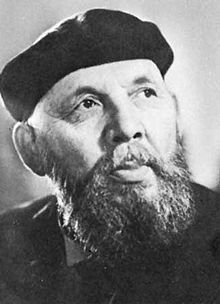Frans Eemil Sillanpää
Frans Eemil Sillanpää | |
|---|---|
 | |
| Born | 16 September 1888 Hämeenkyrö, Finland |
| Died | 3 June 1964 (aged 75) Helsinki, Finland |
| Occupation | Writer |
| Nationality | Finnish |
| Notable awards | Nobel Prize |
Frans Eemil Sillanpää () (16 September 1888 – 3 June 1964) was one of the most famous Finnish writers and in 1939 became the first Finnish writer to be awarded the Nobel Prize for literature.
Early life
Frans Eemil Sillanpää was born into a peasant farming family in Hämeenkyrö. Although his parents were poor, they managed to send him to school in Tampere. In 1908 he moved to Helsinki to study medicine. Here his acquaintances included the painters Eero Järnefelt and Pekka Halonen, composer Jean Sibelius and author Juhani Aho.[1]
Career
Five years later, in 1913 Sillanpää moved from Helsinki to his old home village, married, and devoted himself to writing.[2]
In his work he portrayed rural people living united with the land.[1]
He won international fame for his novel Nuorena nukkunut (The Maid Silja/Fallen Asleep While Young) in 1931.
In 1939, he was awarded the Nobel Prize in Literature "for his deep understanding of his country's peasantry and the exquisite art with which he has portrayed their way of life and their relationship with Nature."[3]
In 1941 Sillanpää divorced his wife. His alcoholism and other ailments needed hospital treatment. In 1943 he returned to public life as a bearded old 'Grandpa Sillanpää'. His radio appearances, especially tradition of talking on Christmas-Eve from 1945 to 1963 became very popular.[4]
The asteroid 1446 Sillanpää, discovered on January 26, 1938 by the renowned Finnish astronomer and physicist Yrjö Väisälä, was named after him.
Death
Sillanpää died on 3 June 1964 in Helsinki aged 75.
Works

- Elämä ja aurinko (1916)
- Ihmislapsia elämän saatossa (1917)
- Hurskas kurjuus (translated as Meek Heritage) (1919)
- Rakas isänmaani (1919)
- Hiltu ja Ragnar (1923)
- Enkelten suojatit (1923)
- Omistani ja omilleni (1924)
- Maan tasalta (1924)
- Töllinmäki (1925)
- Rippi (1928)
- Kiitos hetkistä, Herra... (1930)
- Nuorena nukkunut (translated as The Maid Silja) (1931)
- Miehen tie (1932)
- Virranpohjalta (1933)
- Ihmiset suviyössä (translated as People in the Summer Night) (1934)
- Viidestoista (1936)
- Elokuu (1941)
- Ihmiselon ihanuus ja kurjuus (1945)
External links
- "The Game Behind Finland's First Nobel prize", article (in Swedish; based on documents in the Nobel Archive), first published in Svenska Dagbladet, 5 December 2009; later published in the Finnish daily newspaper Helsingin Sanomat.
- Works by Frans Eemil Sillanpää at Open Library
References
- ^ a b Liukkonen, Petri (2008). "Frans Emil Sillanpää (1888-1964)". Authors Calendar. Retrieved 2016-04-29.
{{cite web}}: Cite has empty unknown parameter:|1=(help) - ^ Frans Eemil Sillanpää Encyclopedia Britannica
- ^ "Frans Eemil Sillanpää - Biographical". Nobelprize.org. Nobel Media AB. 2014. Retrieved 2016-04-29.
- ^ "Sillanpää, Frans Emil (1888 - 1964)". The National Biography of Finland. SKS. Retrieved 2016-04-29.

